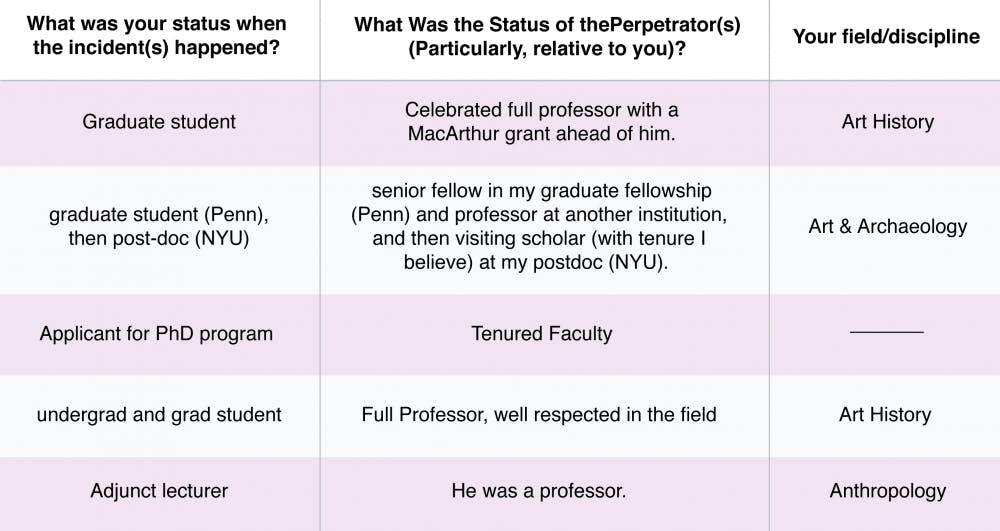
Penn recently joined a growing number of universities to completely ban sexual relations between undergraduates and faculty. While Provost Wendell Pritchett said at the time that this decision was made in an effort "to sustain a campus free of sexual violence, sexual harassment, and all other forms of sexual misconduct," Penn students have questioned whether the policy change meaningfully addresses the issues around sexual misconduct on campus.
Programming Chair of Penn Association of Gender Equality and College sophomore Tanya Jain said that while faculty-student relationships can contribute to the problem due to certain "power dynamic[s]" in such interactions, she thinks the larger issue around sexual misconduct remains unaddressed.
“I think that [the rule banning faculty-student relationships is] definitely a way to deter, to some extent, the sexual assault, but I do think that the majority of sexual assault cases are student to student,” she said.
The 2015 Association of American Universities Campus Climate Survey found that a majority of undergraduate students who had experienced sexual assault or harassment identified another student as the perpetrator. Close to 97 percent of female undergraduate respondents and 96 percent of male undergraduate respondents indicated that their offender was another student.
These rates were different for graduate students. Close to 23 percent of female graduate students identified faculty members, rather than students, as their offenders.
Earlier this year, a public survey with over 2,300 responses revealed that five allegations of sexual harassment may have been perpetrated by members of the Penn community, specifically among faculty members.

College junior Erica Rego said she is pleased that the conversation has begun around sexual misconduct policies at Penn, but that she still hopes to see greater change beyond the ban against student-faculty relations.
“I don’t really think there’s been much of a change yet," Rego said. "I think [the changes are] the right idea and starting to get a conversation going about it, but I don’t think it’s anything to commend until I see an actual change.”
In March, Pritchett and Executive Vice President Craig Carnaroli sent an email to students soliciting suggestions on ways the University can improve policies around sexual harassment on campus. This latest policy change is presumably one of the efforts that the University is taking under this new initiative.
“I personally think that sexual violence between students is a lot more common,” she added. "It’s the right idea, but I don’t know if they’re actually on target yet.”
Jain agreed, adding that the University should continue to address the issues around sexual misconduct on campus with a specific focus on making it easier for victims to report instances of sexual assault.
“I think that Penn does need to improve on making them, one, less complicated and, two, making students feels like they’ll be listened to,” she said.
Wharton sophomore Shaunak Kulkarni expressed different concerns over Penn's recent steps against sexual harassment at Penn.
Kulkarni specifically noted issues with potentially making the reporting processes for sexual harassment at Penn easier and expressed concern over Penn changing methods. He said focusing on reporting methods is not the right approach to issues concerning sexual assault, adding that it could "open the gates to false accusations, which is an equally large problem."
“More important than encouraging people to report or making it easier to report is inculcating a sense of responsibility within people,” he said, adding that he thinks the responsibility is both to report all instances of sexual misconduct when they occur and also not to falsely report instances of sexual assault. “Be responsible to not misuse that power.”
While there has been some dialogue — at Penn and on a national scale — regarding whether the reporting processes are unfair toward the perpetrator, research estimates that only 2-8 percent of reports are false. According to the AAU Campus Climate Survey, only 52 percent of Penn students believed that a victim reporting a crime would be supported by the University, and 35.6 percent of students believed that Penn would take action after a crime had been reported.
Jain also expressed doubt over the Penn's motivations for enacting this change and soliciting ideas.
“I think it’s good that they’re trying to make a change I just don’t know if it’s because of public image or because they are trying to protect students more,” Jain said.
Rego indicated that she thought the University would not follow through to create meaningful change on campus.
“A lot of change needs to be done, and I’m hopeful but I don’t expect too much because at least with me and a lot of other women, Penn has consistently let us down,” she said.
President of Men Against Rape & Sexual Assault and College junior James Hiebert, former Chair of Abuse and Sexual Assault Prevention and College senior Caroline Ohlson, and current ASAP Chair and College junior Kara Hardie declined to comment on this story.
The Daily Pennsylvanian is an independent, student-run newspaper. Please consider making a donation to support the coverage that shapes the University. Your generosity ensures a future of strong journalism at Penn.
Donate







